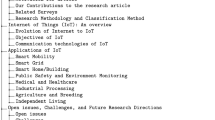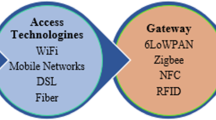Abstract
Recent developments in the Internet of Things have led to the notion of the Internet of Medical Things (IoMT) designed to enhance the standard of healthcare for user-specific services in e-healthcare and e-Medical environments. Sensitive data exposure via wireless media has been attributed to a lack of effective authentication. Due to increased mobility, user and device authentication becomes more laborious and necessitates shared keys. Henceforth, an end-to-end lightweight mutual authentication scheme is required to preserve the privacy of the user and the integrity of medical data. Within the framework of these criteria, the present work introduces a novel Remote Authentication Method (RAM) using Autonomous Shared Keys (ASK) for robust service security. Based on user validity and service distributions, this technique produces remote keys. However, information frequency and service length are used to modify the key-sharing process with federated learning that emphasizes the autonomous key decoupling post-service closure. It relies on the device and service span and its average session duration. The authentication is processed using volatile session keys from the healthcare center to the user application, preventing false user injections. Overall, the performance assessment and multivariate analysis with state-of-the-art protocols prove that the proposed ASK-RAM-IMOT is more reliable and suited for IoMT applications, demonstrating its security strength. There is a significant positive impact on authentication time with a reduction of 10.18% on average. The most intriguing correlation is with the session outage and false rate by 10.63% and 12.19% respectively which contributes to the improved service span of 8.02%.









Similar content being viewed by others
Data Availability
Not applicable.
Code Availability
Not applicable.
References
Verma, R. (2022). Smart city healthcare cyber physical system: Characteristics technologies and challenges. Wireless Personal Communications, 122, 1413–1433. https://doi.org/10.1007/s11277-021-08955-6
Praveen, R., & Pabitha, P. (2023). Improved Gentry–Halevi's fully homomorphic encryption‐based lightweight privacy preserving scheme for securing medical Internet of Things. Transactions on Emerging Telecommunications Technologies, 34(4), e4732. https://doi.org/10.1002/ett.4732
Praveen, R., & Pabitha, P. (2023). A secure lightweight fuzzy embedder based user authentication scheme for internet of medical things applications. Journal of Intelligent & Fuzzy Systems (Preprint). https://doi.org/10.3233/JIFS-223617
Siam, A. I., El-Affendi, M. A., Abou Elazm, A., El-Banby, G. M., El-Bahnasawy, N. A., Abd El-Samie, F. E., & Abd El-Latif, A. A. (2022). Portable and real-time IoT-based healthcare monitoring system for daily medical applications. IEEE Transactions on Computational Social Systems. https://doi.org/10.1109/TCSS.2022.3207562
Arora, D., Gupta, S., & Anpalagan, A. (2022). Evolution and adoption of next generation IoT-Driven health care 4.0 systems. Wireless Personal Communications, 127(4), 3533–3613. https://doi.org/10.1007/s11277-022-09932-3
Pabitha, P., Chandra Priya, J., Praveen, R., & Jagatheswari, S. (2023). ModChain: a hybridized secure and scaling blockchain framework for IoT environment. International Journal of Information Technology, 15(3), 1741–1754. https://doi.org/10.1007/s41870-023-01218-6
Praveen, R., & Pabitha, P. (2022, December). Cryptanalysis of biometric based secure user authentication protocol for IoT applications. In 2022 3rd International Conference on Communication, Computing and Industry 4.0 (C2I4) (pp. 1–6). IEEE. https://doi.org/10.1109/C2I456876.2022.10051341
Abiodun, O. I., Abiodun, E. O., Alawida, M., Alkhawaldeh, R. S., & Arshad, H. (2021). A review on the security of the internet of things: Challenges and solutions. Wireless Personal Communications, 119(3), 2603–2637. https://doi.org/10.1007/s11277-021-08348-9
Verma, R. (2022). Smart city healthcare cyber physical system: Characteristics, technologies and challenges. Wireless personal communications, 122(2), 1413–1433. https://doi.org/10.1007/s11277-021-08955-6
Ghahramani, M., & Javidan, R. (2021). A robust anonymous remote user authentication protocol for IoT services. Wireless Personal Communications, 121(3), 2347–2369. https://doi.org/10.1007/s11277-021-08826-0
Kalaevi, P., Janakiraman, S., Praveen, R., & Muthusankar, D. (2023). An improved ensemble classification-based secure two stage bagging pruning technique for guaranteeing privacy preservation of DNA sequences in electronic health records. Journal of Intelligent & Fuzzy Systems, 44(1), 149–166. https://doi.org/10.3233/JIFS-221615
Madhavi, S., Udhaya Sankar, S. M., Praveen, R., & Jagadish Kumar N. (2023). A fuzzy COPRAS-based decision-making framework for mitigating the impact of vampire sensor nodes in wireless sensor nodes (WSNs). International Journal of Information Technology, 1–12. https://doi.org/10.1007/s41870-023-01219-5
Madhavi, S., Santhosh, N.C., Rajkumar, S., & Praveen, R. (2023). Pythagorean Fuzzy Sets-based VIKOR and TOPSIS-based multi-criteria decision-making model for mitigating resource deletion attacks in WSNs. Journal of Intelligent & Fuzzy Systems (Preprint). https://doi.org/10.3233/JIFS-224141
Sathya, A., & Raja, S. (2021). Privacy preservation-based access control intelligence for cloud data storage in smart healthcare infrastructure. Wireless Personal Communications, 118(4), 3595–3614. https://doi.org/10.1007/s11277-021-08278-6
Deebak, B. D., & Al-Turjman, F. (2020). Smart mutual authentication protocol for cloud based medical healthcare systems using internet of medical things. IEEE Journal on Selected Areas in Communications, 39(2), 346–360. https://doi.org/10.1109/JSAC.2020.3020599
Priya, J. C., Choudhury, T., Khanna, A., & Preethi, R. (2022). Blockchain-based transfer learning for health screening with digital anthropometry from body images. Network Modeling Analysis in Health Informatics and Bioinformatics, 11(23), 1–18. https://doi.org/10.1007/s13721-022-00363-5
Balakrishnan, S., Suresh Kumar, K., Ramanathan, L., & Muthusundar, S. K. (2022). IoT for health monitoring system based on machine learning algorithm. Wireless Personal Communications, 124(1), 189–205. https://doi.org/10.1007/s11277-021-09335-w
Singh, S., Rathore, S., Alfarraj, O., Tolba, A., & Yoon, B. (2022). A framework for privacy-preservation of IoT healthcare data using Federated Learning and blockchain technology. Future Generation Computer Systems, 129, 380–388. https://doi.org/10.1016/j.future.2021.11.028
Gope, P., Gheraibia, Y., Kabir, S., & Sikdar, B. (2020). A secure IoT-based modern healthcare system with fault-tolerant decision making process. IEEE Journal of Biomedical and Health Informatics, 25(3), 862–873. https://doi.org/10.1109/JBHI.2020.3007488
Sudhakar, T., Natarajan, V., Gopinath, M., & Saranyadevi, J. (2020). An enhanced authentication protocol for multi-server environment using password and smart card. Wireless Personal Communications, 115(4), 2779–2803. https://doi.org/10.1007/s11277-020-07462-4
Gope, P., Millwood, O., & Sikdar, B. (2021). A scalable protocol level approach to prevent machine learning attacks on physically unclonable function based authentication mechanisms for internet of medical things. IEEE Transactions on Industrial Informatics, 18(3), 1971–1980. https://doi.org/10.1109/TII.2021.3096048
Sharma, G., & Kalra, S. (2019). A lightweight user authentication scheme for cloud-IoT based healthcare services. Iranian Journal of Science and Technology, Transactions of Electrical Engineering, 43(1), 619–636. https://doi.org/10.1007/s40998-018-0146-5
Padmaja, K., & Seshadri, R. (2021). A real-time secure medical device authentication for personal E-Healthcare services on cloud computing. International Journal of System Assurance Engineering and Management. https://doi.org/10.1007/s13198-021-01148-1
Jia, X., He, D., Kumar, N., & Choo, K. K. R. (2019). Authenticated key agreement scheme for fog-driven IoT healthcare system. Wireless Networks, 25(8), 4737–4750. https://doi.org/10.1007/s11276-018-1759-3
Yao, H., Yan, Q., Fu, X., Zhang, Z., & Lan, C. (2022). ECC-based lightweight authentication and access control scheme for IoT E-healthcare. Soft Computing, 26, 4441–4461. https://doi.org/10.1007/s00500-021-06512-8
Rani, S. S., Alzubi, J. A., Lakshmanaprabu, S. K., Gupta, D., & Manikandan, R. (2020). Optimal users based secure data transmission on the internet of healthcare things (IoHT) with lightweight block ciphers. Multimedia Tools and Applications, 79(47), 35405–35424. https://doi.org/10.1007/s11042-019-07760-5
Wang, W., Huang, H., Xiao, F., Li, Q., Xue, L., & Jiang, J. (2021). Computation-transferable authenticated key agreement protocol for smart healthcare. Journal of Systems Architecture, 118, 102215. https://doi.org/10.1016/j.sysarc.2021.102215
Aghili, S. F., Mala, H., Shojafar, M., & Peris-Lopez, P. (2019). LACO: Lightweight three-factor authentication, access control and ownership transfer scheme for e-health systems in IoT. Future generation computer systems, 96, 410–424. https://doi.org/10.1016/j.future.2019.02.020
Amintoosi, H., Nikooghadam, M., Shojafar, M., Kumari, S., & Alazab, M. (2022). Slight: A lightweight authentication scheme for smart healthcare services. Computers & Electrical Engineering, 99, 107803. https://doi.org/10.1016/j.compeleceng.2022.107803
Chen, X., Liu, Y., Chao, H. C., & Li, Y. (2020). Ciphertext-policy hierarchical attribute-based encryption against key-delegation abuse for IoT-connected healthcare system. IEEE Access, 8, 86630–86650. https://doi.org/10.1109/ACCESS.2020.2986381
Park, K., Noh, S., Lee, H., Das, A. K., Kim, M., Park, Y., & Wazid, M. (2020). LAKS-NVT: Provably secure and lightweight authentication and key agreement scheme without verification table in medical internet of things. IEEE Access, 8, 119387–119404. https://doi.org/10.1109/ACCESS.2020.3005592
Singh, S., & Chaurasiya, V. K. (2022). Mutual authentication framework using fog computing in healthcare. Multimedia Tools and Applications, 81, 31977–32003. https://doi.org/10.1007/s11042-022-12131-8
Preetha, A. D., & Kumar, T. S. (2021). Securing IoT-based healthcare systems from counterfeit medicine penetration using Blockchain. Applied Nanoscience. https://doi.org/10.1007/s13204-021-01984-4
Hajian, R., ZakeriKia, S., Erfani, S. H., & Mirabi, M. (2020). SHAPARAK: Scalable healthcare authentication protocol with attack-resilience and anonymous key-agreement. Computer Networks, 183, 107567. https://doi.org/10.1016/j.comnet.2020.107567
Funding
Not applicable.
Author information
Authors and Affiliations
Corresponding author
Ethics declarations
Conflict of interest
The authors have not disclosed any competing interests.
Additional information
Publisher's Note
Springer Nature remains neutral with regard to jurisdictional claims in published maps and institutional affiliations.
Rights and permissions
Springer Nature or its licensor (e.g. a society or other partner) holds exclusive rights to this article under a publishing agreement with the author(s) or other rightsholder(s); author self-archiving of the accepted manuscript version of this article is solely governed by the terms of such publishing agreement and applicable law.
About this article
Cite this article
Ramalingam, P., Pabitha, P. ASK-RAM-IMOT: Autonomous Shared Keys based Remote Authentication Method for Internet of Medical Things Applications. Wireless Pers Commun 131, 273–293 (2023). https://doi.org/10.1007/s11277-023-10428-x
Accepted:
Published:
Issue Date:
DOI: https://doi.org/10.1007/s11277-023-10428-x




